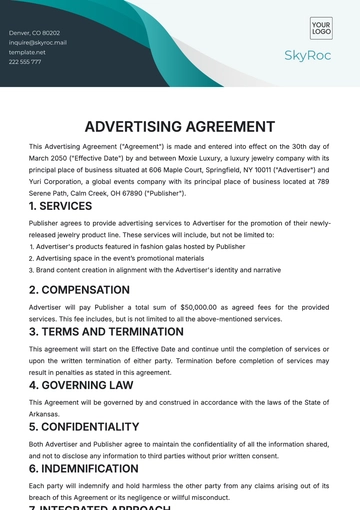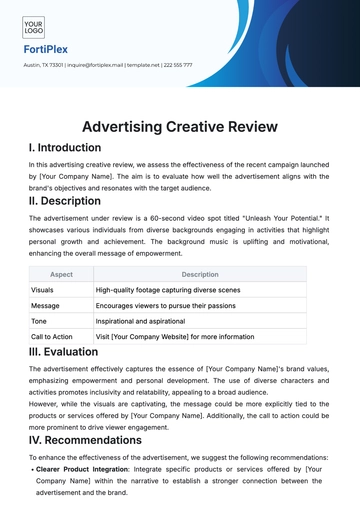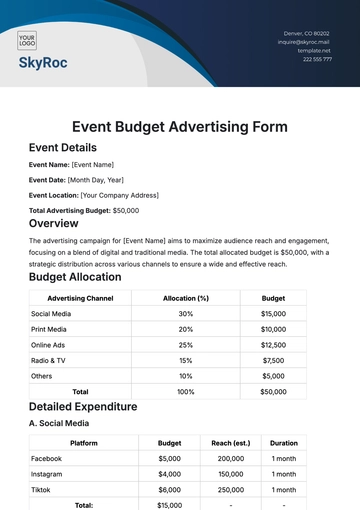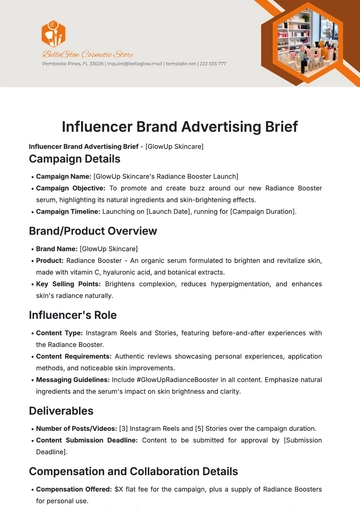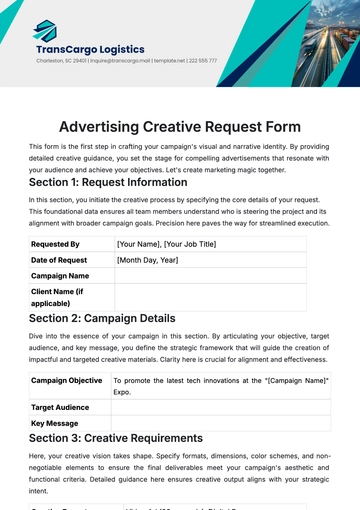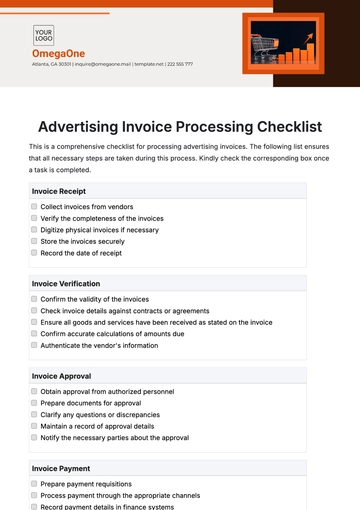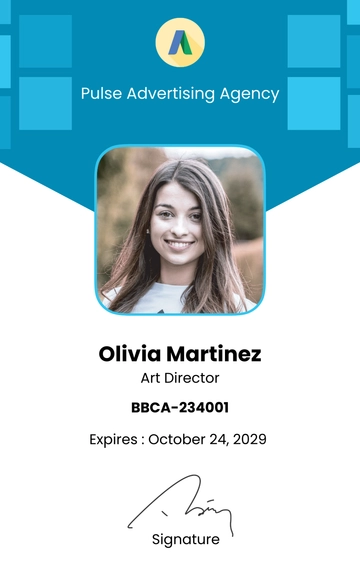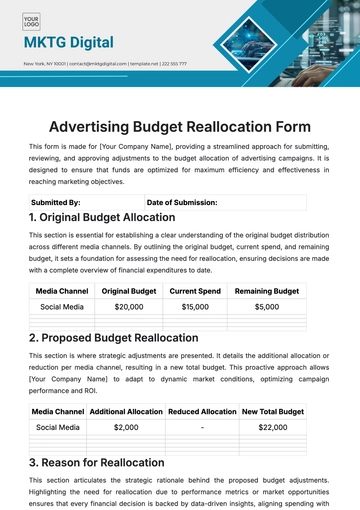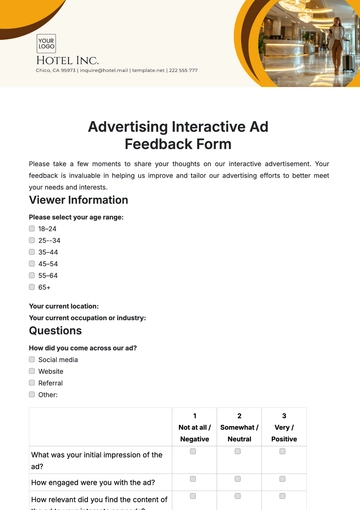Free Financial Control and Ethics in Advertising
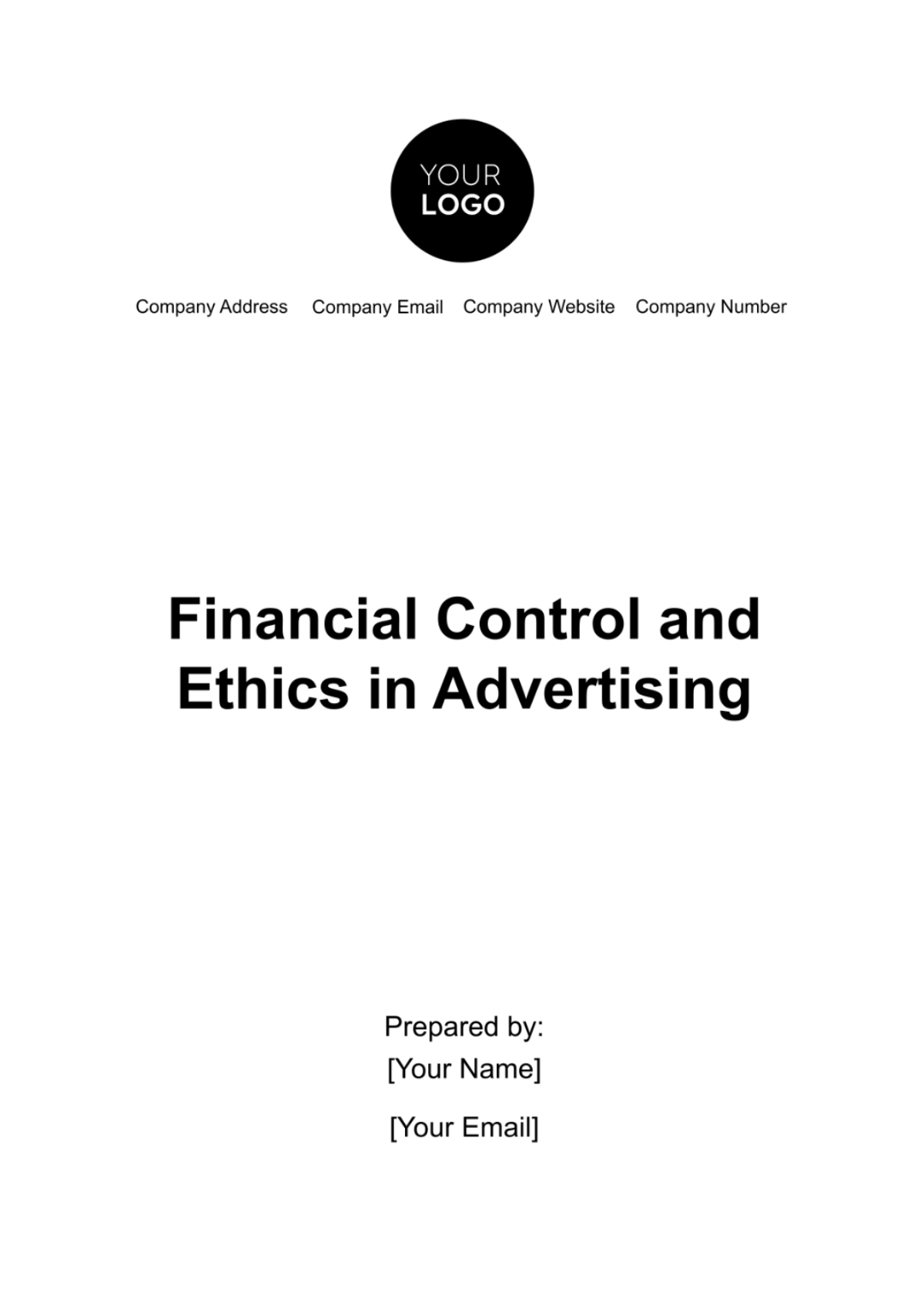
I. Introduction
[Your Company Name] is committed to maintaining the highest standards of financial control and ethical conduct in all of its advertising activities. This document outlines our approach to ensuring that our advertising not only serves our business objectives but also aligns with our corporate values and social responsibilities.
II. Purpose and Scope of Document
This document serves to guide [Your Company Name]'s employees, partners, and stakeholders in understanding and implementing the principles and procedures that underpin our commitment to financial integrity and ethical advertising practices. It covers all forms of advertising, including digital, print, broadcast, and outdoor media.
III. Financial Control in Advertising
A detailed annual budget is established for all advertising activities. This budget is distributed across various media channels based on market research and historical performance data.
Table 3.1.1: Detailed Annual Advertising Budget Distribution
Media Channel | Percentage Allocation | Amount (USD) | Rationale |
|---|---|---|---|
Digital | [50%] | [$0] | High ROI and target audience reach |
A. Approval Processes
Every advertising campaign must pass through a structured approval process. This include:
Initial Proposal: Marketing presents a detailed campaign proposal including objectives, target audience, expected ROI, and budget.
Finance Review: The Finance department assesses the budget feasibility and alignment with the company's financial goals.
Legal and Compliance: Ensures all advertising content is legally compliant and ethically sound.
Executive Approval: Final sign-off by a designated executive authority.
B. Monitoring and Reporting
Each campaign is closely monitored for performance against objectives and budget. Regular reports are generated and include metrics such as ROI, engagement rates, and audience reach. Discrepancies are flagged for immediate review.
C. Risk Management
A detailed Risk Assessment Matrix evaluates potential financial risks, including market fluctuations, regulatory changes, and economic downturns. Contingency plans are developed for high-risk scenarios.
IV. Ethical Guidelines in Advertising
A. Truthfulness and Honesty
All advertising must accurately represent the product or service without misleading claims. This includes clear disclosure of any limitations or conditions.
B. Respect for Consumer Privacy
Our advertising practices adhere to strict data privacy regulations. We ensure that consumer data is collected, stored, and used in a manner that respects consumer privacy and preferences.
C. Social Responsibility
We are committed to socially responsible advertising. This includes avoiding stereotypes, promoting diversity and inclusion, and ensuring our content is appropriate and respectful to all audiences.
D. Compliance with Laws and Regulations
Our advertising complies with all applicable laws and industry standards. This includes regulations related to truth in advertising, consumer protection, and specific regulations governing advertising in different countries.
V. Implementation of Controls and Ethics
A. Training Programs
We provide comprehensive training programs for employees involved in advertising. These programs cover topics like ethical advertising, financial control processes, and legal compliance.
B. Internal Auditing
A dedicated internal audit team regularly reviews advertising practices and financial records to ensure compliance with internal policies and external regulations.
C. Whistleblower Policies
We maintain a confidential whistleblower policy that allows employees and stakeholders to report any concerns about unethical or uncontrolled financial activities without fear of retaliation.
D. Periodic Review and Updates
Our policies and procedures are reviewed annually, or as needed, to reflect changes in laws, industry standards, and company objectives.
VI. Enforcement and Disciplinary Actions
Violations of financial control or ethical guidelines in advertising are taken seriously. Disciplinary actions include:
Immediate Investigation: Any reported violation triggers a prompt and thorough investigation.
Disciplinary Measures: Depending on the severity of the violation, disciplinary actions can range from written warnings to termination of employment.
Corrective Actions: In addition to disciplinary measures, corrective actions are taken to prevent future occurrences. This may include additional training, process changes, or other relevant measures.
The enforcement of these policies is critical to maintaining the integrity and reputation of [Your Company Name] in all advertising activities.
VII. Compliance Monitoring and Review
A. Regular Compliance Audits
Regular audits are conducted to ensure ongoing compliance with internal financial controls and ethical guidelines. An independent internal audit team or external auditors carry out these audits.
B. Performance Review of Advertising Campaigns
A thorough review of each advertising campaign is conducted upon completion. This review assesses both financial performance and adherence to ethical guidelines, drawing insights for future campaigns.
C. Updating Policies and Procedures
Policies and procedures related to financial control and ethical advertising are dynamic. They are regularly updated to reflect changes in the market, technology advancements, and evolving legal and ethical standards.
VIII. Stakeholder Engagement and Transparency
A. Regular Reporting to Stakeholders
Regular reports are provided to stakeholders, including shareholders, board members, and key partners, outlining the performance, compliance, and ethical standing of advertising campaigns.
B. Transparency in Advertising Practices
We commit to transparency in our advertising practices. This includes openly sharing our approach to financial control and ethical advertising with the public and interested parties.
C. Collaboration with Industry Bodies
Active collaboration with industry bodies helps stay abreast of best practices and emerging trends in ethical advertising and financial control.
IX. Crisis Management and Remediation
A. Handling Advertising Missteps
In case of an advertising misstep, a crisis management team is activated to assess the situation, manage communications, and implement remediation steps.
B. Remediation Strategies
Remediation strategies are developed to address any financial or ethical issues arising from advertising activities. These strategies focus on immediate resolution, long-term prevention, and maintaining public trust.
X. Technology and Innovation in Advertising Control
A. Leveraging Technology for Better Control
Adopting the latest technologies, like AI and data analytics, for better monitoring and controlling advertising budgets and ethical compliance.
B. Encouraging Innovative Practices
Encouraging innovative practices in advertising that align with our ethical standards and financial control measures.
XI. Global and Cultural Considerations
A. Adapting to Global Markets
Understanding and respecting the cultural, legal, and ethical norms of different global markets we advertise.
- 100% Customizable, free editor
- Access 1 Million+ Templates, photo’s & graphics
- Download or share as a template
- Click and replace photos, graphics, text, backgrounds
- Resize, crop, AI write & more
- Access advanced editor
Maintain integrity and control in your advertising finances with Template.net's Financial Control and Ethics in Advertising Template. This editable, customizable template is key for enforcing ethical practices and financial control in advertising. It guides advertising and finance professionals in upholding high standards, ensuring compliance, and promoting responsible financial management in advertising endeavors.

